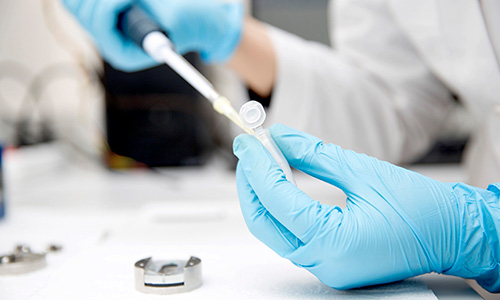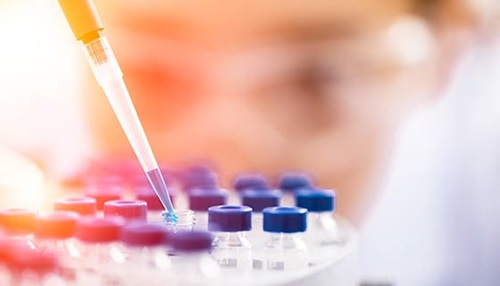If You Get the Corona Virus Can You Get It Again
Coronavirus Diagnosis: What Should I Expect?
Reviewed By:
Updated on Jan 24, 2022
Having COVID-19 varies greatly from one person to some other. What happens if you lot are diagnosed with COVID-19? Lisa Maragakis, M.D., M.P.H., senior managing director of infection prevention, explains what to expect.
What are the stages of coronavirus infection?
There are three general phases of infection with SARS-Cov-ii, the coronavirus that causes COVID-19.
Incubation period. This is the time between getting infected and when symptoms announced. In full general, you may see symptoms showtime two to 14 days afterwards infection. The incubation period varies amidst individuals, and it varies depending on the variant. Even though you practise non have symptoms in the incubation period, you lot tin can transmit the coronavirus to another person during this phase.
This is why, if you suspect you were exposed to someone with COVID-19, you should cocky-quarantine, scout for symptoms and consider getting tested four or five days following the exposure. This way, you lot tin can aid foreclose the spread of COVID-xix. Please review Centers for Disease Command and Prevention (CDC) guidelines for isolation and quarantine.
Acute COVID-19. Once symptoms announced, you take entered the acute phase. You may have fever, cough and other COVID-19 symptoms. Active illness can final one to ii weeks if you have mild or moderate coronavirus illness, but severe cases tin concluding months. Some people are asymptomatic, significant they never have symptoms just practise have COVID-xix.
If you develop symptoms or suspect you lot are asymptomatically infected, call your health care provider, follow testing guidelines, and follow all isolation and safety guidelines.
COVID-xix recovery. Post-COVID-19 symptoms, such every bit lingering cough, on and off fever, weakness, and changes to your senses of scent or sense of taste, can persist for weeks or even months after y'all recover from astute disease. Persistent symptoms are sometimes known as long COVID-19.
Test results may remain positive for weeks to several months post-obit infection, but this does non necessarily hateful you are nevertheless infectious. Almost people are no longer infectious beyond the recommended isolation precautions period. If you lot have conditions that cause severe immunosuppression, contact your health intendance provider to determine how long you should isolate and how to determine when you are no longer potentially infectious to others.
What are COVID-xix symptoms?
Symptoms tin be severe, balmy or absent birthday. Some people recover from COVID-nineteen with no problems, while others are left with lingering effects, and still others require hospitalization or die from complications due to COVID-19.
If you lot accept any of the following symptoms, call your md. He or she will say whether yous need a test and recommend what you should do.
- Fever or chills
- Coughing
- Shortness of jiff or difficulty breathing
- Fatigue
- Musculus or trunk aches
- Headache
- New loss of gustatory modality or smell
- Sore pharynx
- Congestion or runny nose
- Nausea or vomiting
- Diarrhea
Astringent COVID-19 — When to Phone call 911
Yous should call 911 or an emergency intendance facility if y'all experience any astringent symptoms, including:
- Difficulty breathing
- Persistent pain or pressure level in the chest
- New defoliation
- Inability to wake up or stay awake
- Bluish lips or face
Be sure to tell the 911 dispatcher or emergency room if you lot have been exposed to or diagnosed with COVID-19.
How long do COVID symptoms final?
Those with a balmy case of COVID-xix usually recover in i to two weeks. For astringent cases, recovery tin take six weeks or more, and for some, there may be lasting symptoms with or without damage to the centre, kidneys, lungs and brain.
Can I get COVID-nineteen more once?
Yes. Re-infection with the coronavirus, peculiarly with one of the coronavirus variants, is possible if you previously had COVID-xix.
The all-time protection is to become fully vaccinated and receive a booster when eligible, wear a face mask in public, practice concrete distancing and wash your hands oft.
Will I get COVID-19 pneumonia?
Some patients with COVID-19 develop pneumonia. Viral pneumonia, including that acquired by COVID-19, cannot be treated with antibiotics. Some severe cases of COVID-19 may crave ventilator support to ensure the trunk is getting plenty oxygen. Other medications, including antivirals, may likewise be administered.
People over age 65 and those with certain health atmospheric condition are at a higher risk of developing pneumonia and may experience more severe cases of COVID-xix. Studies evidence that in patients with COVID-19, pneumonia may progress into astute respiratory distress syndrome (ARDS), which can be fatal in some patients.

Coronavirus (COVID-19) Electronic mail Alerts
Sign up to receive coronavirus (COVID-19) electronic mail updates from Johns Hopkins Medicine.
What is the treatment for COVID-xix?
Treatment of COVID-19 involves addressing symptoms. If you are at risk for astringent coronavirus affliction, your doctor may recommend one or more than COVID-xix treatments, just for most people with mild COVID-19, residuum and drinking plenty of fluids are the best approach. Your doctor may too propose you take over-the-counter medication for fever.
More severe cases require hospital care, including breathing back up, mechanical ventilation, or other medical treatments.
After COVID-19, when is it rubber for me to exist around other people?
If you are infected with COVID-nineteen or have been exposed to someone who is infected, it is very important to divide yourself from others so that you do not spread COVID-nineteen further. The CDC provides recommendations on isolation and quarantine.
If I accept COVID-19, how tin I keep my family unit safer?
There are several ways to help protect your family:
- Make sure everyone in your family is fully vaccinated and has a booster when eligible.
- Anyone testing positive for the coronavirus should stay in one room away from other people in your dwelling as much as possible. Use a carve up bathroom if 1 is available.
- If you must be in the same room as other people, you and they should wearable face masks. If you cannot clothing a confront mask (for some, face masks may cause trouble breathing), people who alive with you should not be in the same room as you. If they practice enter your room, they should wear a face mask.
- Anybody should practice proficient hygiene, including washing your hands oft for at to the lowest degree xx seconds and coughing or sneezing into your elbow or a tissue (and then throwing the tissue away).
Here are additional precautions:
- Do not share personal household items such as dishes, drinking glasses, cups, utensils, towels or bedding with other people, or with pets. Afterwards using these items, launder them thoroughly.
- All "high-touch" surfaces should be cleaned and disinfected daily, such every bit counters, tabletops, doorknobs, bath fixtures, toilets, phones, keyboards, tablets and bedside tables.
- Any surfaces that may accept blood, stool or other torso fluids on them should exist cleaned right away.
- Household cleaning and disinfectant sprays or wipes are effective: Yous practice not need special products. Exist certain to follow the label instructions on the cleaning production for prophylactic and effective employ.
How can I care for my pets if I accept COVID-19?
According to the CDC, the virus may spread from people to animals during close contact, so it'southward best to follow the same safe measures with your pet as y'all would with people.
- Avoid contact with your pet, including petting, snuggling, being kissed or licked, and sharing nutrient.
- When possible, have another member of your household care for your animals while yous are sick.
- If you must care for them, wear a face mask and wash your hands before and after.

Coronavirus (COVID-19)
What you demand to know from Johns Hopkins Medicine.
Source: https://www.hopkinsmedicine.org/health/conditions-and-diseases/coronavirus/diagnosed-with-covid-19-what-to-expect
0 Response to "If You Get the Corona Virus Can You Get It Again"
ارسال یک نظر